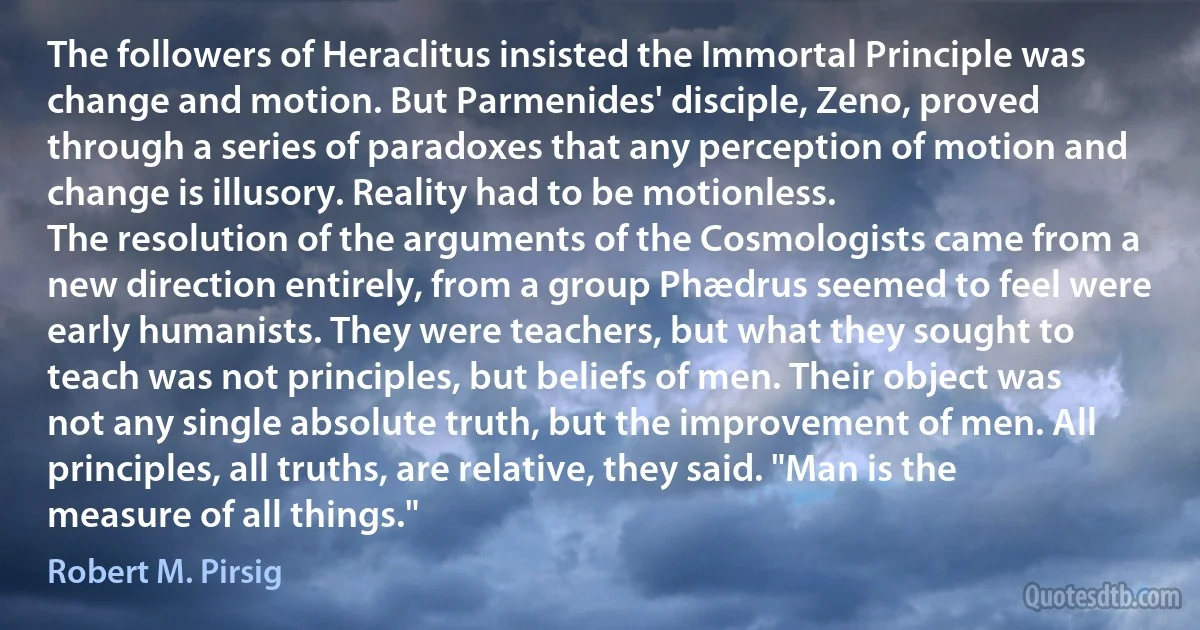
The followers of Heraclitus insisted the Immortal Principle was change and motion. But Parmenides' disciple, Zeno, proved through a series of paradoxes that any perception of motion and change is illusory. Reality had to be motionless. The resolution of the arguments of the Cosmologists came from a new direction entirely, from a group Phædrus seemed to feel were early humanists. They were teachers, but what they sought to teach was not principles, but beliefs of men. Their object was not any single absolute truth, but the improvement of men. All principles, all truths, are relative, they said. "Man is the measure of all things."
Robert M. PirsigRelated topics
came change direction early improvement men man measure perception say seek series single teach truth things Heraclitus ParmenidesRelated quotes
When we seek a textbook case for the proper operation of science, the correction of certain error offers far more promise than the establishment of probable truth. Confirmed hunches, of course, are more upbeat than discredited hypotheses. Since the worst traditions of "popular” writing falsely equate instruction with sweetness and light, our promotional literature abounds with insipid tales in the heroic mode, although tough stories of disappointment and loss give deeper insight into a methodology that the celebrated philosopher Karl Popper once labeled as "conjecture and refutation.”.

Stephen Jay Gould
I have presented the periodic table as a kind of travel guide to an imaginary country, of which the elements are the various regions. This kingdom has a geography: the elements lie in particular juxtaposition to one another, and they are used to produce goods, much as a prairie produces wheat and a lake produces fish. It also has a history. Indeed, it has three kinds of history: the elements were discovered much as the lands of the world were discovered; the kingdom was mapped, just as the world was mapped, and the relative positions of the elements came to take on a great significance; and the elements have their own cosmic history, which can be traced back to the stars.

Peter Atkins
Coleridge observes that all men are born Aristotelians or Platonists. The latter feel that classes, orders, and genres are realities; the former, that they are generalizations. For the latter, language is nothing but an approximative set of symbols; for the former, it is the map of the universe. The Platonist knows that the universe is somehow a cosmos, an order; that order, for the Aristotelian, can be an error or a fiction of our partial knowledge. Across the latitudes and the epochs, the two immortal antagonists change their name and language: one is Parmenides, Plato, Spinoza, Kant, Francis Bradley; the other, Heraclitus, Aristotle, Locke, Hume, William James.

Jorge Luis Borges
As regards the security of a country against foreign invasion, it is interesting to note that it depends only on the relative, and not the absolute, number of the individuals or magnitude of the forces, and that, if every country should reduce the war-force in the same ratio, the security would remain unaltered. An international agreement with the object of reducing to a minimum the war-force which, in view of the present still imperfect education of the masses, is absolutely indispensable, would, therefore, seem to be the first rational step to take toward diminishing the force retarding human movement.

Nikola Tesla
The mark of Platonic philosophy is a radical dualism. The Platonic world is not one of unity; and the abyss which in many ways results from this bifurcation appears in innumerable forms. It is not one, but two worlds, which Plato sees when with the eyes of his soul he envisages a transcendent, spaceless, and timeless realm of the Idea, the thing-in-itself, the true, absolute reality of tranquil being, and when to this transcendent realm he opposes the spacetime sphere of his sensuous perception-a sphere of becoming in motion, which he considers to be only a domain of illusory semblance, a realm which in reality is not-being.

Hans Kelsen
